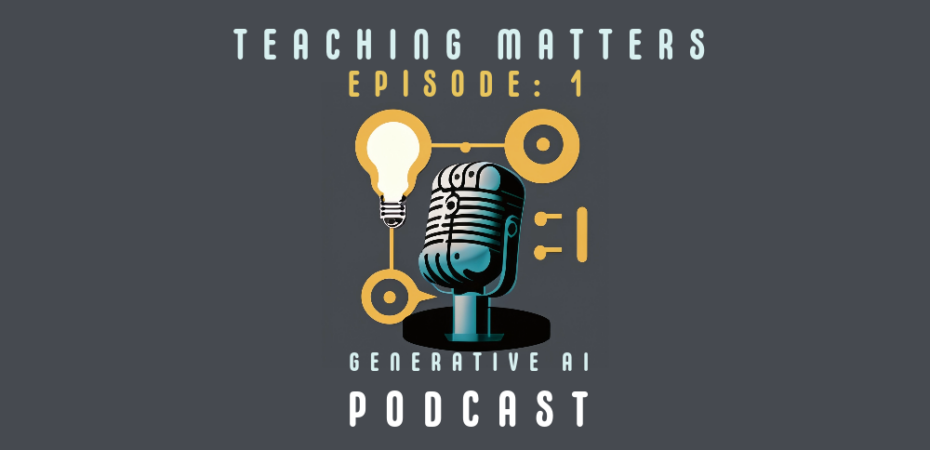
What distinguishes generative AI and GPTs in particular from previously existing A.I. technologies?
Since roughly 2010, the difference is that we now have lots of data due to our extensive use of the internet, which has become the main source for training algorithms to learn from examples. Generative means it creates something new from data. It is pre-trained, meaning the technology is trained according to certain types of rules and certain deliverable goals. As Vasileios illustrates in the podcast episode:
…for example, when it comes to text, it [GPT] takes all existing texts about a given topic it can find and then it transforms it into something that looks like the previous examples. But it is not the same statistically…. [this is] quite important in the context of plagiarism.
While the speed at which GPTs produce responses is attractive, the hidden implications and risks they pose to learning and assessments should be carefully explored:
If you could paraphrase in the past… certain phrases, certain wording, certain sentences, and submit the coursework to a marker, it would be tedious. It would take, say, roughly 3 hours at the very best. So we hoped as educators that by this, the student could learn the content of what they would be paraphrasing. But if the machine is able to paraphrase just based on statistics, and then the text looks quite original and not detectable by other machines. Then the problem is there! (- Vasileios)
Finally, these technologies are designed based on all of the rules that we know from the attention economy and so on, to attract people in, to lure them into using them more and more and more.
What are the effects and the implications of hype in the use of this technology?
The technological hype and automation causes over-reliance on the machine and over-investment both in mental and financial ways, hinders creativity and causes cumulative environmental impact. As Vasileios explains,
You think that this is a good tool that we could actually embed in our everyday structures and infrastructures within our word processors, within our browsers, and therefore we can have a reliable tool. So we build up our expectations around it without looking at specific problems that might be associated with it.
It’s like an extension of what we used to call the Google Effect that we kind of forget how to search what it means to search.
What actually is a GPT and what are the current uses of this technology apart from literally generating text?
Current uses of GPTs include:
- Producing ‘standard’ texts of which there exist many examples such as cover letters, form, etc.
- Useful for text editing, especially when English is not one’s first language.
- Provides a rich collection of vocabulary ranging from complex to accessible terms.
- Writing code, for instance Python.
- Interpreting statistical results.
- Interpreting a graph.
Vasileios also adds:
I ask students to actually use it in class, to use it in their essays, but also report on how they used it, in what were their – difficulties in sort of polishing and so on.
But goes on to warn:
…like I said before, we need to be very, very careful with these things, because in statistics, it’s extremely easy to extrapolate from a given graph and say that a meaning is such and such, whereas a more careful interpretation would include certain parameters, hidden variables. So context is extremely important in this case. That is what has been true about AI for a long time, that machines are particularly incompetent in understanding social context…
How can we expect these technologies to develop and evolve in the future? Where can we see this going?
Vasileios ponders,
A.I. history has taught us is that the labour shifts not from the user to the machine per se, but from the user to an array of workers around the world that enable the existence of this machine. So with AI, there’s this sort of reskilling type of process. So indeed, few jobs might be considered a bit obscured and outdated. But then there’s a new market for many other jobs. Now, to what extent we actually want that? That is a deeper educational philosophical question or political question but I would say that it’s certainly a player at the moment.
Considering this imbrication of corporation, the tech industry and its political ramifications, Vasileios closes this episode saying:
expect the unexpected…
Timestamps:
2:11-What distinguishes generative AI and GPTs in particular from previously existing A.I. technologies?
6:22 – What are the effects and the implications of hype for the use of this technology?
10:01 – What actually is a GPT and what are the current uses of this technology apart from literally generating text, where can we see this technology?
14:27 – How can we expect these technologies to develop and evolve in the future? Where can we see this going?
 Vasileios Galanos
Vasileios Galanos
Vasileios Galanos (it/ve/vem) is a Teaching Fellow in Science, Technology and Innovation Studies at the School of Social and Political Science, University of Edinburgh and Associate Editor of the journal, Technology Analysis and Strategic Management. Vasileios researches and publishes on the interplay of expectations and expertise in the development of AI, robotics, and internet technologies, with further interests in cybernetics, media theory, invented religions, oriental and continental philosophy, community-led initiatives, and art. Vasileios is also a book, vinyl, beer cap, and mouth harp collector – using the latter instrument to invite students back from class break.
Twitter handle: @fractaloidconvo
Episode produced and edited by:
 Sylvia Joshua Western
Sylvia Joshua Western
Sylvia is currently doing her PhD in Clinical Education at The University of Edinburgh and has a Master’s degree in Clinical Education. Her PhD research explores test-wise behaviours in Objective Structured Clinical Examination (OSCE) context. Coming from a dental background, she enjoys learning about and researching clinical assessments. She works part-time as a PhD intern at Teaching Matters, the University’s largest blog and podcast platform through Employ.ed scheme at the Institute of Academic Development.
 Joséphine Foucher
Joséphine Foucher
Joséphine is doing a PhD in Sociology at The University of Edinburgh. Her research looks at the intersection between art and politics in contemporary Cuba. She supports Jenny Scoles as the Teaching Matters Co-Editor and Student Engagement Officer through the PhD Intern scheme at the Institute for Academic Development.


